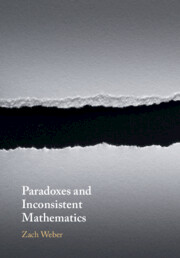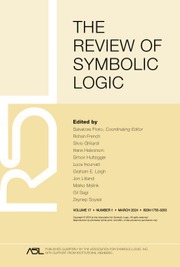Paradoxes and Inconsistent Mathematics
- Author: Zach Weber, University of Otago, New Zealand
- Date Published: April 2024
- availability: Not yet published - available from October 2024
- format: Paperback
- isbn: 9781108995009
Paperback
Other available formats:
Hardback, eBook
Looking for an inspection copy?
This title is not currently available for inspection. However, if you are interested in the title for your course we can consider offering an inspection copy. To register your interest please contact [email protected] providing details of the course you are teaching.
-
Logical paradoxes – like the Liar, Russell's, and the Sorites – are notorious. But in Paradoxes and Inconsistent Mathematics, it is argued that they are only the noisiest of many. Contradictions arise in the everyday, from the smallest points to the widest boundaries. In this book, Zach Weber uses “dialetheic paraconsistency” – a formal framework where some contradictions can be true without absurdity – as the basis for developing this idea rigorously, from mathematical foundations up. In doing so, Weber directly addresses a longstanding open question: how much standard mathematics can paraconsistency capture? The guiding focus is on a more basic question, of why there are paradoxes. Details underscore a simple philosophical claim: that paradoxes are found in the ordinary, and that is what makes them so extraordinary.
Read more- Provides a committed presentation of the idea that there are true contradictions in the everyday world, and that some 'universal' paraconsistent logic is the answer
- Develops some basic mathematics using paraconsistent logic
- Follows the commitment to 'dialetheism' to its logical end-point
Reviews & endorsements
'Zach Weber's Paradoxes and Inconsistent Mathematics is easily one of the most important books in inconsistent mathematics - and contradiction-involving theories in general - since the pioneering books of Chris Mortensen (1995), Graham Priest (1987) and Richard Sylvan (formerly Routley) (1980) … Not since said pioneering works have I encountered a more important book on would-be true contradictory theories than Weber's … The development of such inconsistent maths from the pioneering ideas … to Weber's latest work is as significant as the development from chiseling stone tablets to recent smart phones.' Jc Beall, Notre Dame Philosophical Reviews
Customer reviews
Not yet reviewed
Be the first to review
Review was not posted due to profanity
×Product details
- Date Published: April 2024
- format: Paperback
- isbn: 9781108995009
- length: 337 pages
- dimensions: 244 x 170 x 18 mm
- weight: 0.584kg
- availability: Not yet published - available from October 2024
Table of Contents
Part I. What are the Paradoxes?: Introduction to an inconsistent world
1. Paradoxes
or, 'here in the presence of an absurdity'
Part II. How to Face the Paradoxes?:
2. In search of a uniform solution
3. Metatheory and naive theory
4. Prolegomena to any future inconsistent mathematics. Part III. Where are the Paradoxes?:
5. Set theory
6. Arithmetic
7. Algebra
8. Real analysis
9. Topology. Part IV. Why Are there Paradoxes?:
10. Ordinary paradox.
Sorry, this resource is locked
Please register or sign in to request access. If you are having problems accessing these resources please email [email protected]
Register Sign in» Proceed
You are now leaving the Cambridge University Press website. Your eBook purchase and download will be completed by our partner www.ebooks.com. Please see the permission section of the www.ebooks.com catalogue page for details of the print & copy limits on our eBooks.
Continue ×Are you sure you want to delete your account?
This cannot be undone.
Thank you for your feedback which will help us improve our service.
If you requested a response, we will make sure to get back to you shortly.
×

